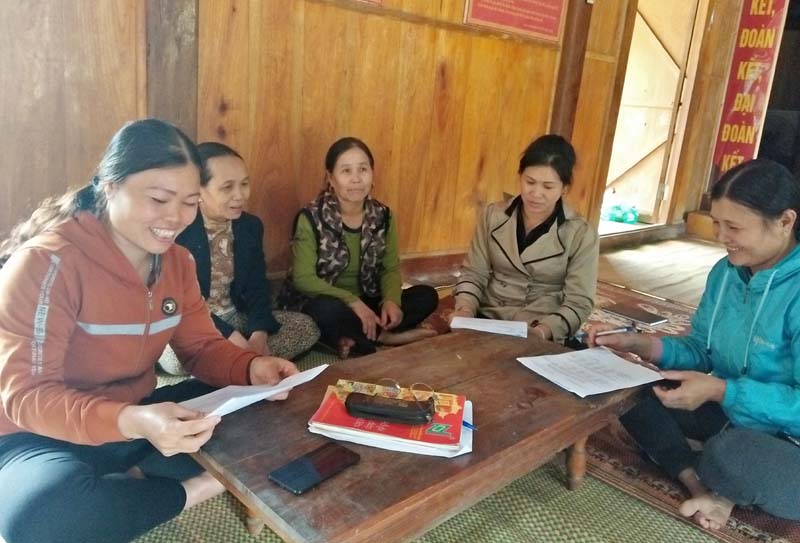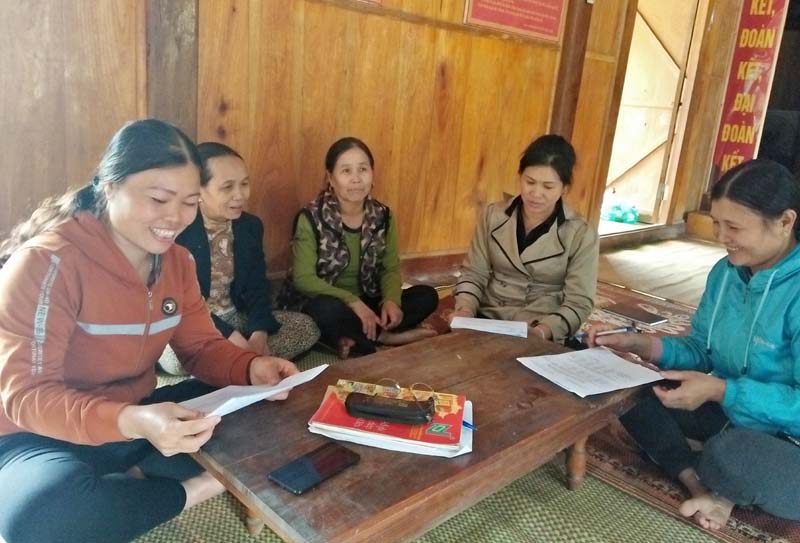


 The members of the model "Mobilizing women’s savings to buy
health insurance for the family health” of the Women’s Union of Dong Bang
hamlet, Dong Bang commune (Mai Chau) are drafting the content of saving to buy
health insurance and supporting the other members to develop economy.
The members of the model "Mobilizing women’s savings to buy
health insurance for the family health” of the Women’s Union of Dong Bang
hamlet, Dong Bang commune (Mai Chau) are drafting the content of saving to buy
health insurance and supporting the other members to develop economy.
Ms. Hoang Thi Duyen, the Chairwoman of the provincial Women's Union says that from the beginning of 2017, the provincial Women's Union has a plan to build and deploy the model, coming to the conclusion to promulgate the regulations on collaboratively implementing the policies and laws on social insurance and health insurance for the period of 2017-2020. In the middle of May, the provincial Women's Union coordinated with the Women's Union of Luong Son district to launch a pilot model in Tan Vinh commune, a commune with a low percentage of women and people participating in health insurance (only 61%), with a reduced tendency for a basis of replication throughout the province.
The model was established with 15 members, who have not yet participated in health insurance. Each member would raise 200,000 VND a month for capital turnover. Each month they help at least two members to buy health insurance.
The model has received a positive response from its members and it has expanded to 9 branches to set up a savings group to buy health insurance with 115 members so far. Thereby, the percentage of people buying health insurance has increased by over 90%, contributing to bringing Tan Vinh commune to meet 19 criteria and being recognized the standard of a new rural commune. As for the pilot model in Coi village, the proportion of people buying health insurance has reached over 90% (increased by 37% compared to that of 2016).
In order to implement the model successfully, the Provincial Women's Union has set the specific targets and guided the ways and methods to build and implement the model. In particular, they have focused on propagating and disseminating the knowledge about the Law on Health Insurance.
From the pilot model in Tan Vinh commune, each district and city has chosen one facility to build a pilot model in the areas where the percentage of members and women buying health insurance is still low and the awareness of health insurance is limited. The top priority has been given to the communes which are on the way to the target of the new rural areas and the communes which have just been excluded from Program 135.
All levels of the Union have reviewed and made the statistics of the number of members and women who have not yet bought health insurance and found out the reasons why they have not yet bought. The savings groups and teams of women have been set up. There are from 15 to 20 members in each group and team with the form of revolving savings.
The savings level is unified and decided by each group and team. The union and the model have a regular meeting on one day of the month. At the meeting, they often propagate and mobilize learning about the Law on Health Insurance, Social Insurance and the related documents, and select the members, women and households to support and help buy health insurance ...
Up to now, nine out of the eleven districts and the city (except for Kim Boi and Da Bac districts, because of the fact that the area is exempted from buying 100% health insurance) have reviewed, established and maintained the effectiveness of 135 pilot models with the participation of 3,065 members, supporting the purchase of 4,675 health insurance cards. The level of capital contribution is from 50 to 100 thousand VND a member every month. Some groups contribute from 150-200 thousand VND a member every month.
Thereby, the percentage of members and women buying health insurance has increased compared to that of 2016. Typically, Yen Thuy Women's Union has increased by 5.92%, The Union of Mai Chau has increased by 9.3% and that of Luong Son has increased by 9.77% and the percentage of participants of health insurance and social insurance has increased from 92.22% in 2016 to 95.53% in 2019 in the whole province.